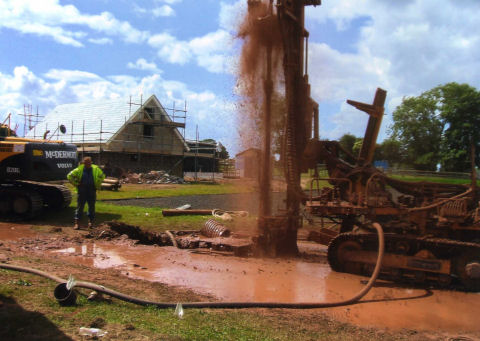 |

dowsing water, noble minerals,
oil/gas fields, geopathic stress using advanced map dowsing
|
|
|
Considering drilling a
borehole this year?
These are the questions
you must ask your driller
| What happens in case of a
dry hole? Many drillers only charge a dry hole 'at cost' , but do you know how much
'at cost' is?
To clients who need natural
water sources.
This is the way it is when locating your water source:
If you use a driller only there will be no guarantee of success.
The potential success of hitting water would be in the region of
65-70%.
|

Borehole in Whitchurch dowsed by Peter |
|
If you combine the skill of
a professional water dowser to assist the driller by locating the
borehole site, you will increase your success rate to at least
90-95%. There is no way you can have a 100% success rate, there is
always a risk. If you only use a driller to locate a source of
water and it turns out to be dry, the cost would be anything from
£1,500 to £1,700. If you are more unlucky and have a second
borehole drilled and that fails also, that will cost you from
£3,500 to £4,000 so you see it becomes an expensive project,
whereas, you can increase your chances of success by using a
professional dowser.
I cannot accept
any responsibility if it is the drillers fault. If I am not
present when drilling takes place I am not responsible against any
dry holes as I would not be aware of what has taken place.
Also if there are any marl clays, mudstones and bolder clays or
any heavy clays that we may come across in drilling
on the site I will still find
the water but I will have to take into account the amount of clay
that we have come across and add this to my depth count. In regard
to a further site in the Whitchurch area I still managed to find
water at a depth of 280 meters despite there being large volumes
of clays on the site. Even with geological maps of the area and
site these maps do not necessarily give the true structure of the
area and the true depths of the clays on site in question.
Subject to seasonal changes
claims against dry holes can only be made if the dowser is present
when drilling takes place and it is proven that it is the dowsers
fault.
No dowser /diviner should ever try
and guarantee 100% a successful location because there are to many
things that can happen which are out of the dowser/diviner's
control. This is why I try and take photographs of the locations
where I have made a site visit.
Up to date I have now completed 1,070 successful borehole and
springs to date and now have 32 years experience.
|
What diameter of pipe will be
used?
Listen carefully to what your
driller says to you... there are two pipes involved in the final
installation - a metal pipe, and a plastic inner pipe which slides
down inside it. This inner pipe needs to be at least 4" wide and must
be surrounded by gravel. ( This is the way it should be done but not
all drillers surround the pipe with gravel as the gravel acts as a
filter before it enters the plastic pipe to go into the pump.) The metal pipe needs to be at least
6" wide to accommodate all this. Any less than this and the speed of
your water flow will be sub-optimal.
Will you use screwed or welded metal pipes?
There are cost
implications to you - but be aware your choice can make a big
difference to how quickly your water becomes usable. Welded pipes
whilst cheaper have caused contamination in some cases.
 |
| |
 |
| |
 |
| |
 |
| |
 |
| Peter
Taylor dowsed this site in Shropshire and attended for the
drilling |
|
Will a dowser be used?
Incredibly, whilst some drillers
do use dowsers, many don't.
Instead they make use of geological maps of the area plus an onsite visit
to ascertain (make an educated guess) where they might find water. (Many drillers
charge a fee just for visiting your site to see if there might be a
place where they could drill for water - so do remember to ask before
you invite them over.)
A professional water dowser from the BSD register will make a
preliminary remote dowse of your site. If water is found then
he'll visit your site to mark the location. I will do my best to find
clean water and also recommend that all boreholes drilled need to be
tested with the appropriate authorities afterwards. The dowser will also in most cases be
available to attend the drilling and oversee the job to ensure all
goes smoothly.
The driller must slow down when the dust changes
to bits as the drilling bits will be hot and the moisture from the
water once comes in contact with the hot drill bit would change to
clay and form a cone
seal preventing the water from penetrating into the borehole.
Will the driller slow down
as he approaches the water?
Do you know the
signs that
show that water is about to be hit. There are subtle
changes to
the nature of the waste being thrown out of the hole as
the water
is approached. Basically the waste changes from 'dust' to
bits'. If the driller continues to drill at the same speed
through this there is a 50% chance that the water course
will
become sealed off - permanently clogged with dust and
clay. What
the driller should do (but sometimes doesn't do) when the
dust
turns to bits, is to slow right
down. This enables him to drill accurately into the water
source
and place an optimal sump beneath it to gather the water. Many
drillers, eager to finish the job as quickly as possible, may be
tempted to overlook the need for slowing down at this point.
This may lead to big problems. The water may be missed altogether,
or the water produced may be contaminated with minerals. In all
cases the most sensible option is to drill slowly when the target
depth recommended by the dowser is approached. Extra care at this
stage is essential and can impact the effectiveness of the whole
job. The dowser can not be held responsible if the recommendations
of the dowser are ignored.
Disclaimer - When the dowser
gives his report it is a snapshot of the underground water and
shows the current situation. But this can not be relied on
indefinitely, water tables change from year to year and from
season to season.
|
|
|
Does your contract specify
water?
It is not enough to have the word 'water'
alone on the contract you must specify 'water', if you only
use the word water in your drilling contract , and the driller hits undrinkable water (sour
water) you will still be liable for the full fee. This can occur
if the driller goes beyond the recommended depth advised by the
dowser. Some drillers will say that in their price they quote a
depth of 400 feet which will be in the price even if you go 50
feet and hit the water which will make it 200 feet sufficient for
that particular borehole. If the water is hit at say 150 feet a
sump of 50 feet will be adequate even if the driller says “you
have still got 200 feet left or spare to create a sump”. You
must remember that the further 200 feet you are increasing the
risk of contamination from the minerals within the ground.
'No water No fee' is an often used
expression in water drilling contracts - but this isn't always as fair
as it sounds.
These are just a few of the pitfalls that you
may hit when contracting to bore for water.
Sadly as a dowser I am often called
to the site after unsuccessful boreholes have been drilled, which
means I have personally witnessed the problems that can occur. As
an independent advisor I can talk you through your contract,
highlighting any areas where you need to ask more questions.
Drilling a borehole is an expensive undertaking, you may decide
it's worth spending a few pounds on an independent advisor such as
myself to save yourself the expense and worry of possible
problems.
The best thing is to use your instincts or ask a professional
dowser for advice and for him to monitor the process of drilling
when it takes place until they hit the water. If I am not present
when drilling takes place then I am not responsible for any
problems which may occur.
Would you like to speak to
Peter? just call
01352 754052 for a
free no-obligation discussion about your situation or email:
peterjtaylor9@gmail.com
Another of Peter's jobs in
South Wales |
|
One question
people ask me all the time is how much does drilling cost?
Different drillers have different
methods. Some drillers give you a quote by the meter other
drillers give you a quote on just having the bore hole done
and the pipe installed into the bore hole with stone which
is half the job. Other drillers will give you a quote on the
completion of the job which involves driving the bore hole,
installing the plastic pipes with the filters and the pump
and the steel casing and the electrical equipment. The
prices will vary from driller to driller and what type of
drilling takes place. For instance air drilling the price
can range from £5,000 per bore hole to £10,000 per bole
hole, but this depends on what part of the country you live
in. If it's what is called "mud drilling" which is a system
of using a water supply to reduce the force of the stones
coming through the bore hole that is even more expensive. It
can be anything from £10,000 to £18,000 per bore hole. Again
this depends on what part of the country you live in, e.g.
the southeast the drilling process can be up to £30,000 per
borehole per site. This will depend on the depth that you
are actually drilling. It also depends on the individual
Companies. The best thing to do would be to get at least 3
quotes. This does not mean that the highest quote would be
the best one to choose. The best thing is to use your
instincts or ask a professional dowser for advice and for
him to monitor the process of drilling when it takes place
until they hit the water. If I am not present when drilling
takes place then I am not responsible for any problems which
may occur. All quotes and estimates, including
pricing estimates and flow rates are subject to change.
|
|
|
|
|